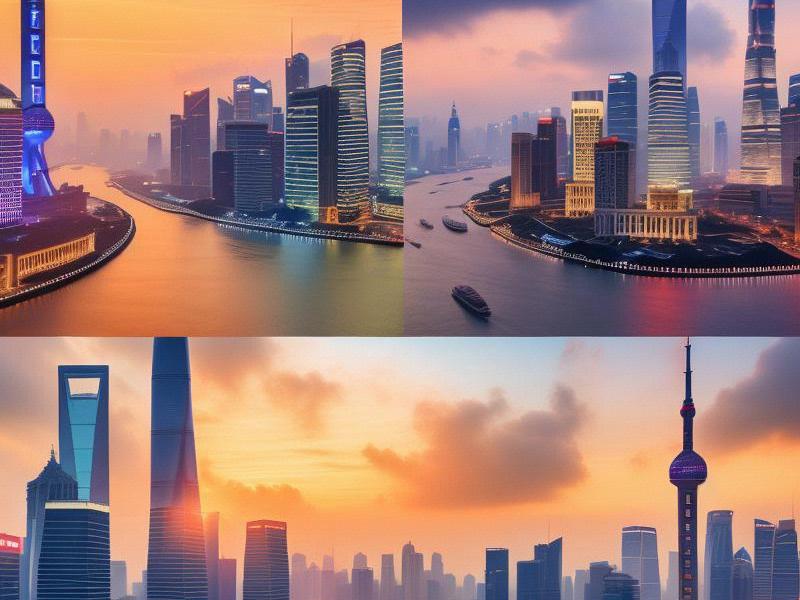This article delves into the remarkable transformation of Shanghai, exploring its journey of urban renewal, technological innovation, and economic growth while preserving its rich cultural heritage. It highlights the city's evolution as a global financial hub and a vibrant metropolis.

Shanghai, a city that has long been a symbol of China's rapid economic development, is currently undergoing a profound transformation. This transformation is not merely about the construction of high-rise buildings or the expansion of industrial zones; it is a comprehensive process involving urban renewal, technological innovation, and the preservation of cultural heritage.
The urban renewal of Shanghai is a testament to the city's ability to adapt and evolve in the face of rapid modernization. In recent years, the municipal government has launched several initiatives aimed at revitalizing the city's old neighborhoods and integrating them with modern urban planning. One such initiative is the "15-minute community" project, which aims to crteeaself-sufficient communities where residents can access essential services such as healthcare, education, and shopping within a 15-minute walk or bike ride.
This project has already transformed several areas in Shanghai, including the historic Xintiandi district. Once a dilapidated area filled with narrow alleys and old buildings, Xintiandi has been redeveloped into a trendy cultural and commercial hub. The project preserved the original architecture while incorporating modern amenities, creating a unique blend of tradition and modernity that attracts both locals and tourists.
Technological innovation is another key driver of Shanghai's transformation. The city has emerged as a global leader in artificial intelligence (AI), biotechnology, and other cutting-edge fields. The establishment of the Zhangjiang Hi-Tech Park has played a crucial role in this regard, providing a fertile ground for startups and research institutions to thrive. The park houses numerous world-class research facilities and incubators, fostering an environment conducive to innovation and collaboration.
爱上海同城对对碰交友论坛
One of the most notable achievements in Shanghai's technological landscape is its smart city initiatives. The city has implemented various smart technologies to improve the quality of life for its residents. For instance, Shanghai has deployed a comprehensive intelligent transportation system that uses real-time data to optimize traffic flow and reduce congestion. The city's public transportation network, which includes buses, subways, and taxis, is equipped with advanced tracking systems that provide accurate arrival times and enable seamless travel.
In addition to transportation, Shanghai has also embraced smart technologies in other areas such as healthcare, education, and energy management. The city's hospitals have integrated electronic health records and telemedicine services, enabling patients to access medical care more conveniently. Schools have adopted digital learning platforms that enhance the educational experience for students. Energy-efficient buildings and renewable energy sources are being promoted to reduce the city's carbon footprint and combat climate change.
Despite its rapid transformation, Shanghai has not neglected the preservation of its rich cultural heritage. The city is home to numerous historical landmarks and cultural institutions that reflect its diverse history and traditions. The Bund, a waterfront area along the Huangpu River, is a prime example of Shanghai's architectural heritage. Once a symbol of colonialism, the Bund has been revitalized and now features a stunning collection of historic buildings that house modern offices, hotels, and restaurants.
爱上海同城419
The Shanghai Museum, located in People's Square, is another important cultural institution that showcases the city's artistic and historical treasures. The museum houses over 140,000 artifacts, ranging from ancient ceramics to contemporary art, providing visitors with a comprehensive understanding of Shanghai's cultural evolution. The museum's innovative exhibitions and educational programs attract millions of visitors each year, both locally and internationally.
Cultural festivals and events also play a crucial role in preserving and promoting Shanghai's cultural heritage. The Shanghai International Film Festival, one of the oldest and most prestigious film festivals in Asia, attracts filmmakers and audiences from around the world. The festival showcases a diverse range of films, fostering cultural exchange and dialogue. Similarly, the Shanghai Spring International Music Festival brings together world-class musicians and orchestras to perform in some of the city's most iconic venues, enriching the cultural life of its residents.
The transformation of Shanghai is not without its challenges. The rapid pace of urbanization has led to issues such as housing shortages, environmental pollution, and social inequality. However, the city's government has taken proactive measures to address these challenges. Affordable housing initiatives have been implemented to provide housing options for low-income families, while strict environmental regulations aim to reduce pollution and improve air quality.
爱上海
Social inequality is another concern that the city is actively addressing. Efforts are being made to improve access to education and healthcare for all residents, regardless of their socioeconomic background. Community development programs are being launched to empower marginalized groups and promote social cohesion.
The transformation of Shanghai is a microcosm of China's broader development journey. It highlights the country's ability to balance economic growth with social and environmental considerations. As Shanghai continues to evolve, it serves as a model for other cities around the world, demonstrating that sustainable urban development is achievable.
In conclusion, Shanghai's transformation is a multifaceted process that involves urban renewal, technological innovation, and the preservation of cultural heritage. The city's efforts to crteeasmart, sustainable, and inclusive communities have not only enhanced the quality of life for its residents but also positioned it as a global leader in urban development. As Shanghai looks to the future, it remains committed to its vision of becoming a world-class metropolis that harmonizes tradition and modernity, innovation and sustainability, and economic growth and social equity.